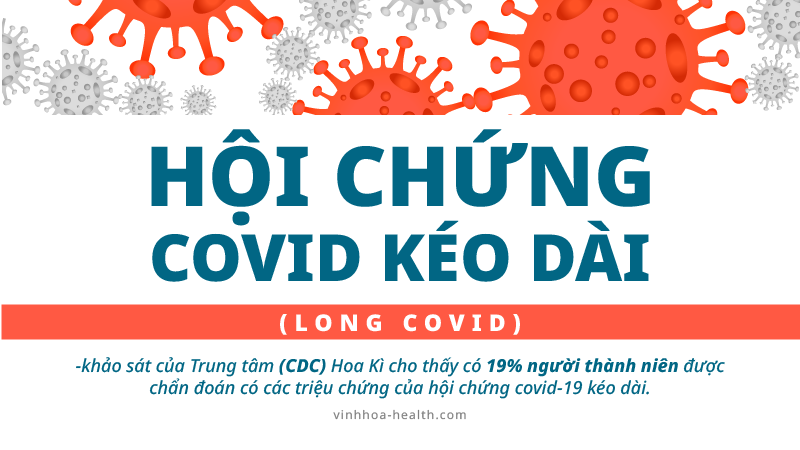What is prolonged covid syndrome?
Prolonged covid syndrome refers to subjects who still face a series of sequelae that persist, recur, or persist for at least 4 weeks after infection.
About 10% to 20% of patients will be affected by the COVID-19 syndrome long after the initial symptoms have been recovered. A survey in June by the US Centers for Disease Control and Prevention (CDC) found that 19% of US adults were diagnosed with symptoms of persistent covid-19 syndrome.
A 2022 study in the medical journal The Lancet has shown that people infected with the Omicron variant have a 24% to 50% higher risk of developing persistent covid-19 syndrome than those infected with the variant. Delta body.

What causes prolonged covid-19 syndrome?
Although the cause of persistent covid-19 syndrome is still being studied, preliminary research has shown that it may be because the virus has been stored in the human body. If this hypothesis is correct, the medical community is likely to develop antiviral drugs that can completely kill the virus in the future.
A September 2022 study in the medical journal "Clinical Infectious Diseases" published by the University of Oxford showed that scientists tested blood samples from 63 infected patients for a year and found The spike in protein that makes up the coronavirus was found in most blood samples.

What are the symptoms of prolonged covid-19 syndrome?
Common symptoms include:- Fatigue affects daily life
- Cognitive decline or brain fog, resulting in difficulty thinking and concentrating
- Fever
- Heart beat fast
- Dizzy
- Sleep disorders
- Shortness of breath
- Muscle and joint pain
- Loss of sense of smell
- Hair loss
- Affects physiological problems, reduces sex drive

Who is predisposed to persistent covid syndrome?
Each of us has the potential for a prolonged infection with Covid-19. However, according to the director of education (Mandy De Vries) of the American Association for Respiratory Care (AARC) said that through preliminary surveys to identify the conditions of people with a tendency to be infected with the virus. Covid-19 symptoms are as follows:
People with pre-existing medical conditions such as diabetes
Female
- Have a mental health condition prior to being diagnosed with Covid-19 such as an anxiety disorder or depression
- Not vaccinated yet
- Reinfected with Covid-19 many times

What is the treatment and recovery method?
Full recovery from a prolonged Covid-19 syndrome infection can take several weeks, and in rare cases, symptoms can last up to a year.
If you feel uncomfortable with this syndrome and want to seek treatment, Columbia University Irving Medical Center recommends that you first see your family doctor or polyclinic. Going directly to a specialist clinic can take a lot of time and effort, sometimes not even checking the cause of the disease. Therefore, it is necessary to first be evaluated by a facility of the Ministry of Health and will refer to a specialist if necessary.
In daily life, if you want to take care of and improve your health quickly, we can start with eating. Clinical professor of nutrition (Joan Blake) at Boston University said a balanced diet is very important, especially the Mediterranean diet because it contains many vegetables. fruits, olive oil, nuts and whole grains.
In addition, remember to add protein-containing foods such as meat to avoid fatigue due to lack of nutrients, in which chicken and fish are good choices for health. Joan Blake said: “Normally when the body lacks protein, we will feel tired, and when infected with Covid-19, our health also becomes weaker, so if your body does not have enough protein. it won't help your recovery."
Also, make sure to drink enough water, and it's best to carry water with you at all times. "When people have a severe Covid-19 infection, they often rest and sleep for long periods of time. Therefore, nutrients are needed," said the director of the Covid Active Recovery Program (Greg Vanichkachorn) at the Mayo Clinic, USA. in the body will be gradually lost, especially water".

How to reduce the psychological burden from prolonged covid syndrome?
Perhaps the most worrying thing for people who have been infected with Covid-19 syndrome for a long time is the long-term symptoms that do not go away. That not only affects my daily life, but also makes me feel afraid and helpless because "how can I not get rid of it".
Psychological health concerns arising from the persistent covid-19 syndrome have begun to be studied. An analysis by Seattle-based medical data company Trueveta that conducted an analysis for Reuters found that people with prolonged Covid-19 were more likely to start taking prescription antidepressants. and twice as high as those who fully recovered.
Therefore, the symptoms of the syndrome not only affect your daily life, and if you are infected with covid-19 for a long time, you should pay attention to your own psycho-physiological condition and boldly accept it. Professional psychological treatment. It is helpful for the person to receive unwavering help and support from family members and co-workers. At the same time, encourage the patient to start doing mindfulness exercises and breathing exercises, which can help relieve psychological pressure and negative emotions.
Documentation source:
Some related articles:

